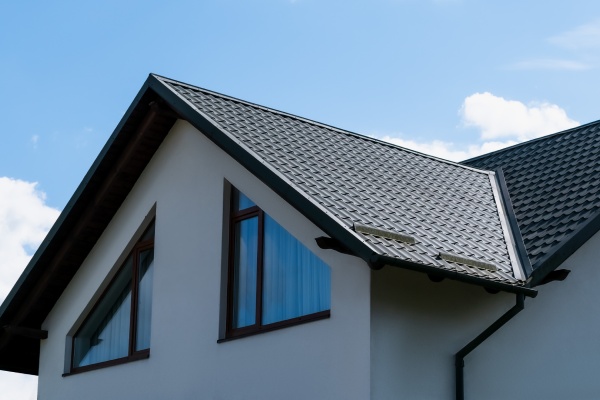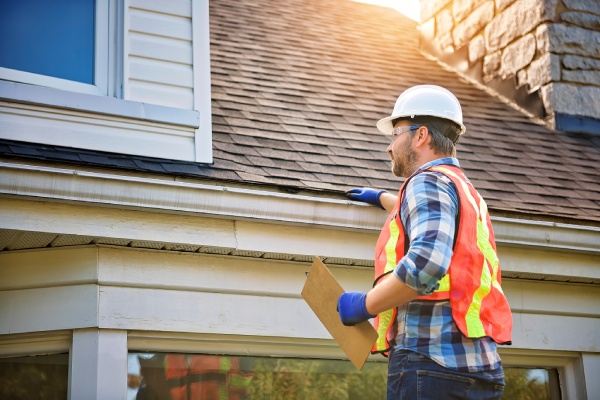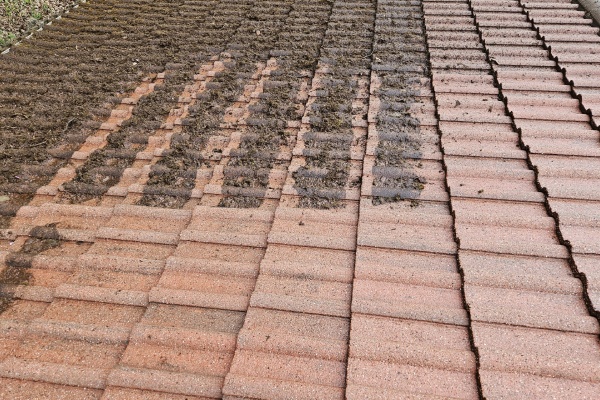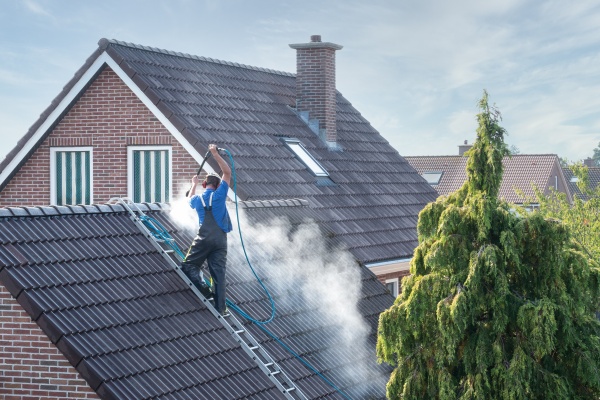When was the last time you thought about your roof? Probably not until you noticed a stain, a leak, or some suspicious green growth creeping along the shingles. Your roof is your home’s first line of defense that braves the elements day in and day out. But without proper care, it can deteriorate faster than you think. Enter soft washing—a gentle, effective solution that not only cleans but also extends the life of your roof.
 What is Roof Soft Washing?
What is Roof Soft Washing?
Soft washing is a specialized low-pressure cleaning method that uses water and biodegradable cleaning solutions to tackle dirt, algae, moss, and mildew on your roof. Unlike pressure washing, which relies on brute force, soft washing focuses on science. It targets and eliminates contaminants without causing damage.
The secret lies in its approach: soft washing doesn’t just clean; it addresses the root causes of grime to keep your roof cleaner for longer. By using a combination of disinfecting agents, such as sodium hypochlorite (bleach) and surfactants, this method penetrates the surface to break down organic growth. This makes your roof spotless and prevents organic growth from returning quickly.
Soft washing is especially effective for roofs made from delicate materials like asphalt shingles, cedar shakes, or clay tiles. These materials can easily sustain damage from high-pressure water streams, which is what makes soft washing an ideal choice.
The Benefits of Soft Washing Your Roof
1. Prolonged Roof Lifespan
Your roof faces constant exposure to harsh weather conditions, UV rays, and environmental contaminants. Over time, algae, moss, and lichen can erode roofing materials, weaken shingles, and lead to costly repairs. Soft washing removes these harmful elements and extends the lifespan of your roof by years. Studies indicate that regular maintenance can increase a roof’s lifespan by up to 50%.
By preventing the premature breakdown of materials, soft washing helps homeowners save thousands of dollars on unnecessary repairs and replacements.
2. Eco-Friendly and Safe
Many homeowners are skeptical about the environmental impact of roof cleaning. Soft washing offers an eco-friendly solution by using biodegradable and non-toxic cleaning agents. These solutions break down safely and won’t harm nearby plants, pets, or water sources when applied correctly.
Also, soft washing uses less water than traditional pressure washing methods. This makes it a more responsible and sustainable choice for maintaining your roof.
3. Cost-Effective Maintenance
While the upfront cost of soft washing may seem comparable to or slightly higher than pressure washing, its long-lasting results make it the more economical choice. The cleaning solutions used in soft washing continue to work long after the initial treatment. This reduces the frequency of necessary cleanings.
By investing in soft washing, you’re not only protecting your roof but also saving money on energy bills. Clean roofs reflect sunlight better, reduce heat absorption, and lower cooling costs during hot months.
4. Improved Curb Appeal
A clean, well-maintained roof can dramatically improve the overall appearance of your property. Soft washing removes unsightly black streaks, moss patches, and algae growth, thereby restoring your roof to its original glory. This is especially important if you’re planning to sell your home, as a pristine roof can increase its market value.
Soft Wash vs. Pressure Washing: The Great Debate
Let’s address the common dilemma: Should you soft wash or pressure wash your roof? While both methods aim to clean, the differences in technique and outcomes are significant.
Let’s address the common dilemma: Should you soft wash or pressure wash your roof? While both methods aim to clean, the differences in technique and outcomes are significant.
| Feature | Soft Washing | Pressure Washing |
| Pressure Level | Low pressure, gentle on roofing materials | High pressure, potentially damaging |
| Cleaning Approach | Uses biodegradable solutions to kill algae/moss | Relies on water force to remove surface dirt |
| Suitable Roof Types | All roof materials (e.g., asphalt, clay tiles) | Limited; may damage delicate materials |
| Environmental Impact | Eco-friendly, uses less water | Higher water usage, may harm surroundings |
| Longevity | Prevents regrowth for 1-3 years | Temporary; regrowth is quicker |
High-Pressure Risks
Pressure washing uses forceful water jets to blast away dirt. While effective for hard surfaces like driveways and patios, this method can wreak havoc on your roof. High pressure can:
- Dislodge shingles or tiles.
- Strip protective granules that shield your roof from UV damage.
- Force water beneath roofing materials, causing leaks and structural damage.
Why Soft Washing Wins
Soft washing, in contrast, employs low-pressure water and specialized cleaning solutions to remove dirt and organic growth gently. This method is safe for all roofing materials and ensures thorough cleaning without the risk of damage. By addressing the root causes of grime, such as algae spores, soft washing delivers longer-lasting results compared to pressure washing’s surface-level cleaning.
Moreover, soft washing often costs less in the long run. The minimal risk of damage means you avoid expensive repairs and replacements, making it a smart investment.
 The Soft Wash Process: A Behind-the-Scenes Look
The Soft Wash Process: A Behind-the-Scenes Look
Curious about how soft washing works? Here’s a breakdown of the process:
1. Inspection
Professionals begin by assessing your roof’s condition. They identify areas with heavy organic growth, damaged shingles, or potential hazards. This step makes sure the cleaning process is tailored to your roof’s specific needs.
2. Preparation
To protect your property, cleaners cover nearby plants, windows, and outdoor furniture. They also remove loose debris, such as leaves or branches, from the roof.
3. Application
The cleaning solution—a mix of water, bleach, and surfactants—is applied using specialized low-pressure sprayers. This solution is designed to cling to the roof’s surface to break down dirt, moss, and algae at the root.
4. Dwell Time
The solution is left to sit for 10-15 minutes, allowing it to penetrate and dissolve stubborn contaminants. This step ensures thorough cleaning and kills organisms like algae, preventing regrowth.
5. Rinsing
Finally, the roof is rinsed with clean water at low pressure. This removes the cleaning solution along with all loosened debris, leaving your roof spotless.
 Common Misconceptions About Soft Washing
Common Misconceptions About Soft Washing
Myth 1: Soft Washing is Less Effective
Some people believe soft washing isn’t as powerful as pressure washing. In reality, soft washing is more effective for roofs because it eliminates the root causes of grime, such as algae spores, rather than just removing surface dirt.
Myth 2: It’s Harmful to Plants and the Environment
Modern soft wash solutions are biodegradable and safe for the environment. Professionals like Frontline take additional precautions, such as pre-wetting plants and covering sensitive areas, to make sure that no harm comes to your landscaping.
Myth 3: It’s Just for Aesthetics
While soft washing dramatically improves a roof’s appearance, its primary benefit is functional. Removing harmful growths and preventing damage helps your roof last longer and perform better.
Choosing the Right Professional Service
Not all roof cleaning services are created equal. When hiring a professional roof cleaning company, look for:
- Experience: Choose a company with a proven track record of soft washing roofs.
- Certifications: Check technicians are trained and certified in soft wash techniques.
- References: Ask for testimonials or references from past clients.
Ask potential providers about their cleaning solutions, equipment, and guarantees to make sure that you’re getting the best service.
 Roof Soft Wash FAQs
Roof Soft Wash FAQs
1. What is the difference between roof soft washing and pressure washing?
Soft washing uses low pressure and cleaning solutions to remove dirt and algae without damaging roofing materials, while pressure washing uses high-pressure water that can harm delicate surfaces.
2. Is soft washing safe for all types of roofs?
Yes, soft washing is safe for materials like asphalt shingles, clay tiles, and cedar shakes, as it doesn’t rely on high pressure that could cause damage.
3. How often should I soft wash my roof?
Most roofs benefit from soft washing every 1-3 years, depending on environmental factors like humidity, tree coverage, and local climate.
4. Will the cleaning solution harm my plants or pets?
Professional soft wash services use biodegradable and non-toxic solutions, and they take precautions like covering plants to prevent harm.
Maintain Your Roof With Frontline Home Solutions
Your roof is more than a shelter; it’s an essential part of your home’s structure and curb appeal. Frontline Home Solutions has over 30 years of experience providing home solutions in the Rio Grande Valley with 5-star reviews from more than 240 clients. Let our local, licensed, and trusted experts help you maintain, repair, or even replace your roof with industry-leading warranties and the best industry practices around. Contact us today to get a free quote

 What is Roof Soft Washing?
What is Roof Soft Washing? The Soft Wash Process: A Behind-the-Scenes Look
The Soft Wash Process: A Behind-the-Scenes Look Common Misconceptions About Soft Washing
Common Misconceptions About Soft Washing Roof Soft Wash FAQs
Roof Soft Wash FAQs

